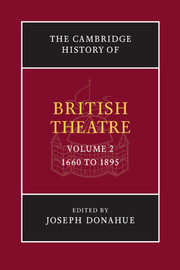Book contents
- Frontmatter
- Part I 1660 to 1800
- 1 Introduction: the theatre from 1660 to 1800
- 2 Theatres and repertory
- 3 Theatre and the female presence
- 4 Theatre, politics and morality
- 5 Theatre companies and regulation
- 6 The Beggar’s Opera A case study
- 7 Garrick at Drury Lane, 1747–1776
- 8 Theatre outside London, 1660–1775
- 9 1776 A critical year in perspective
- 10 The theatrical revolution, 1776–1843
- Part II 1800 to 1895
- Bibliography
- Index
- References
4 - Theatre, politics and morality
from Part I - 1660 to 1800
Published online by Cambridge University Press: 28 March 2008
- Frontmatter
- Part I 1660 to 1800
- 1 Introduction: the theatre from 1660 to 1800
- 2 Theatres and repertory
- 3 Theatre and the female presence
- 4 Theatre, politics and morality
- 5 Theatre companies and regulation
- 6 The Beggar’s Opera A case study
- 7 Garrick at Drury Lane, 1747–1776
- 8 Theatre outside London, 1660–1775
- 9 1776 A critical year in perspective
- 10 The theatrical revolution, 1776–1843
- Part II 1800 to 1895
- Bibliography
- Index
- References
Summary
In March 1660 the parliamentary general George Monck marched on London, restored to the Rump Parliament the members excluded in 1648, and thereby made possible the return of the King, in May. The fall of the Puritan régime restored not only the monarchy but legal, regular theatre, the right to perform plays being quickly restricted to two companies, the King’s and the Duke’s. Indeed Monck’s intervention was celebrated on the stage as it was happening, in the first Carolean comedy, John Tatham’s The Rump. A year later, these events were redramatized in a more serious form in the Earl of Orrery’s tragicomedy The Generall, whose hero Clorimun unwillingly fights for a usurper, but eventually restores the true king. Orrery’s next play, The History of Henry theFifth, also portrays the restoration of royal authority (the recovery of France), and so close was the relationship between theatre and politics that (not for the first time) Charles II loaned garments from his coronation, so that the final spectacle of the play is of stage royalty resplendent in the finery of the true.
Yet the dramatist who thus made free with Charles’s coronation apparel had not long before made free with his crown, for Orrery had served Cromwell throughout the 1650s, and in 1657 had taken a leading role in urging him to become king. After Cromwell’s death, however, he had established links both with Monck and Charles II, and had indeed hoped to claim the role of restoring hero for himself. In his service of the usurper, Clorimun reflects Orrery’s position in the 1650s; in his restoration of the true line, however, he performs an act of which Orrery was only an envious and frustrated onlooker.
- Type
- Chapter
- Information
- The Cambridge History of British Theatre , pp. 90 - 107Publisher: Cambridge University PressPrint publication year: 2004
References
- 1
- Cited by



